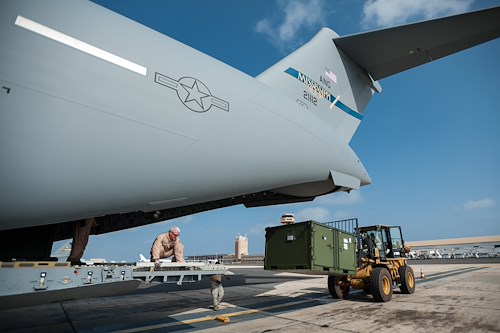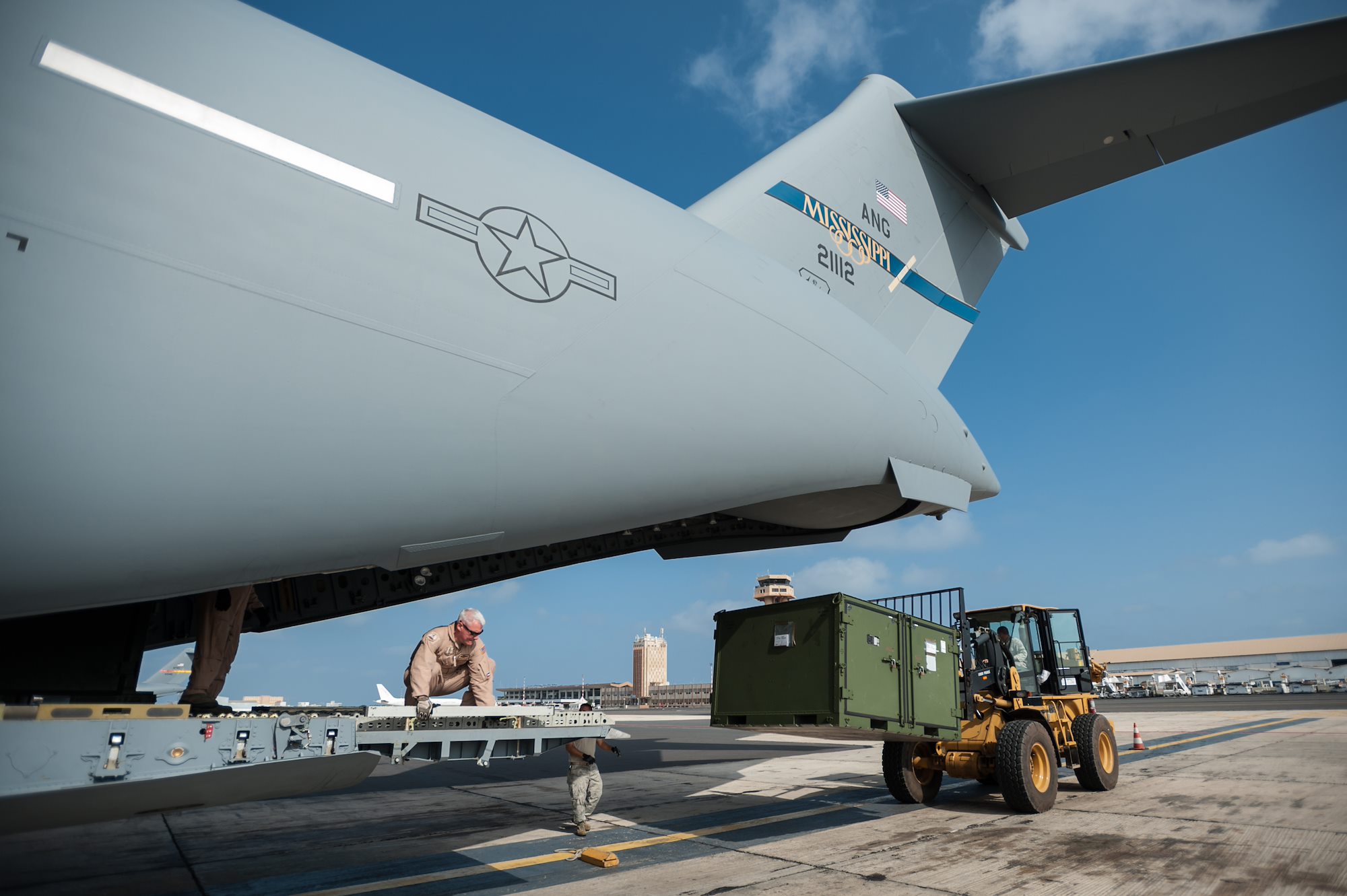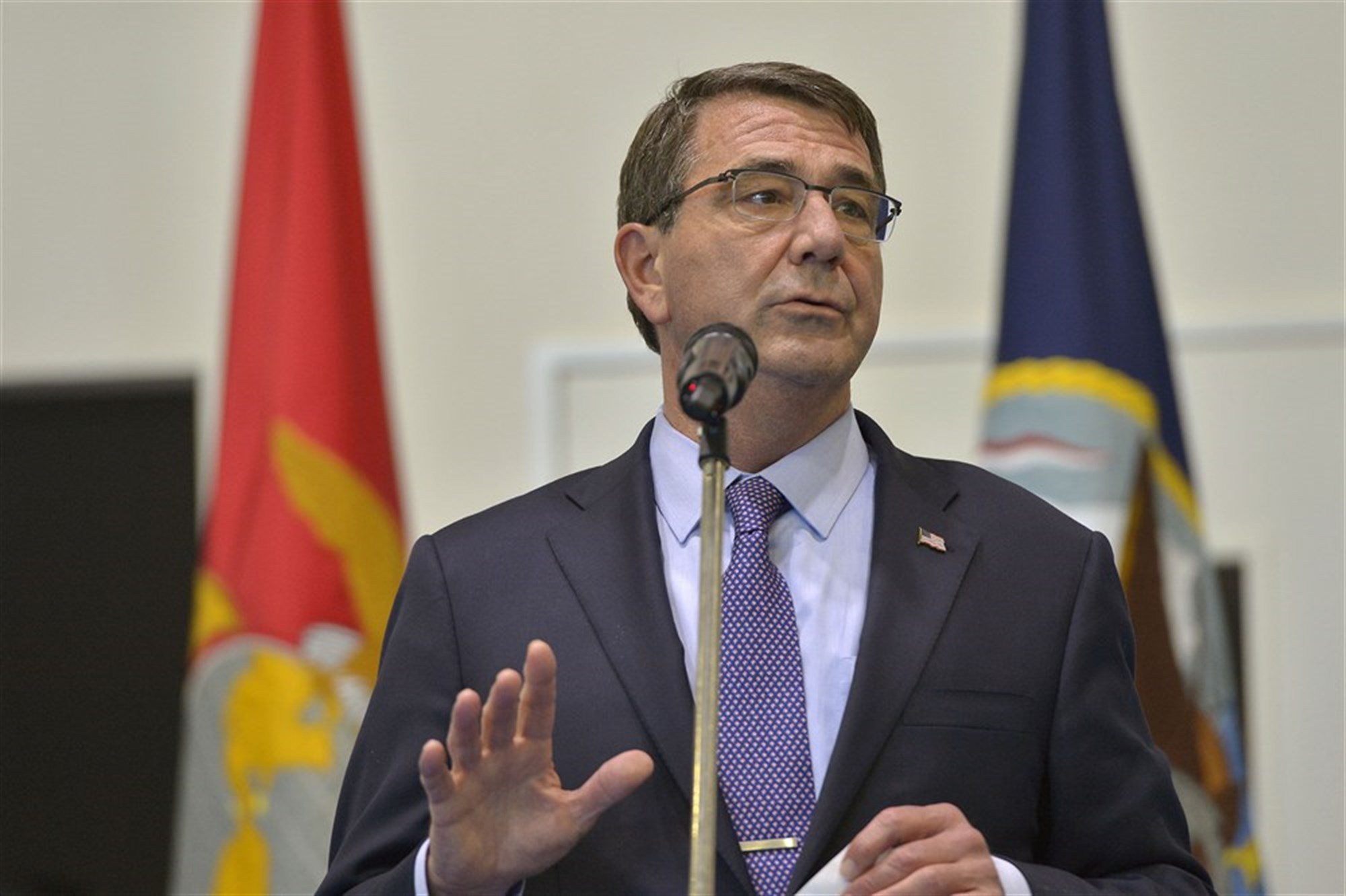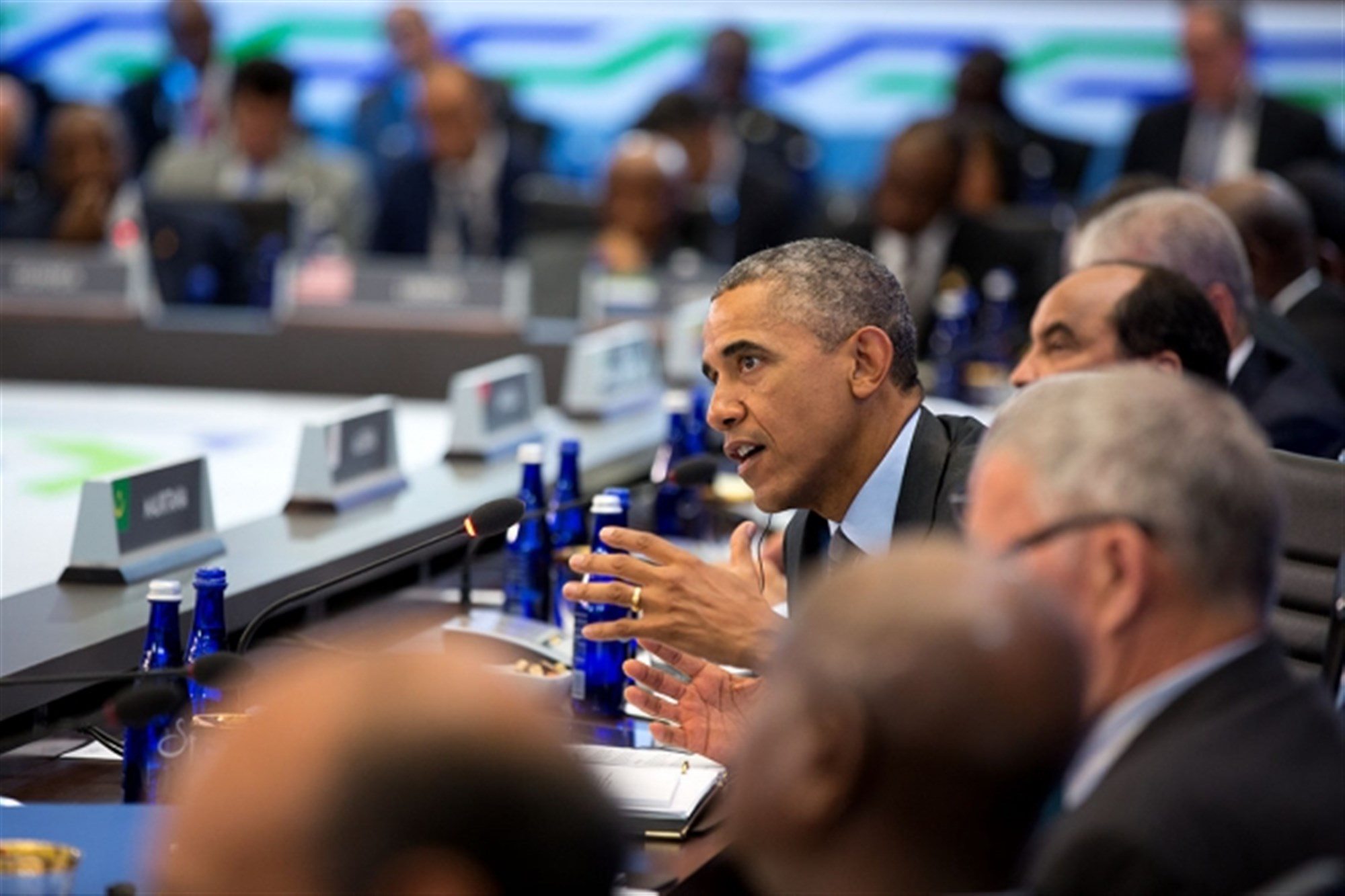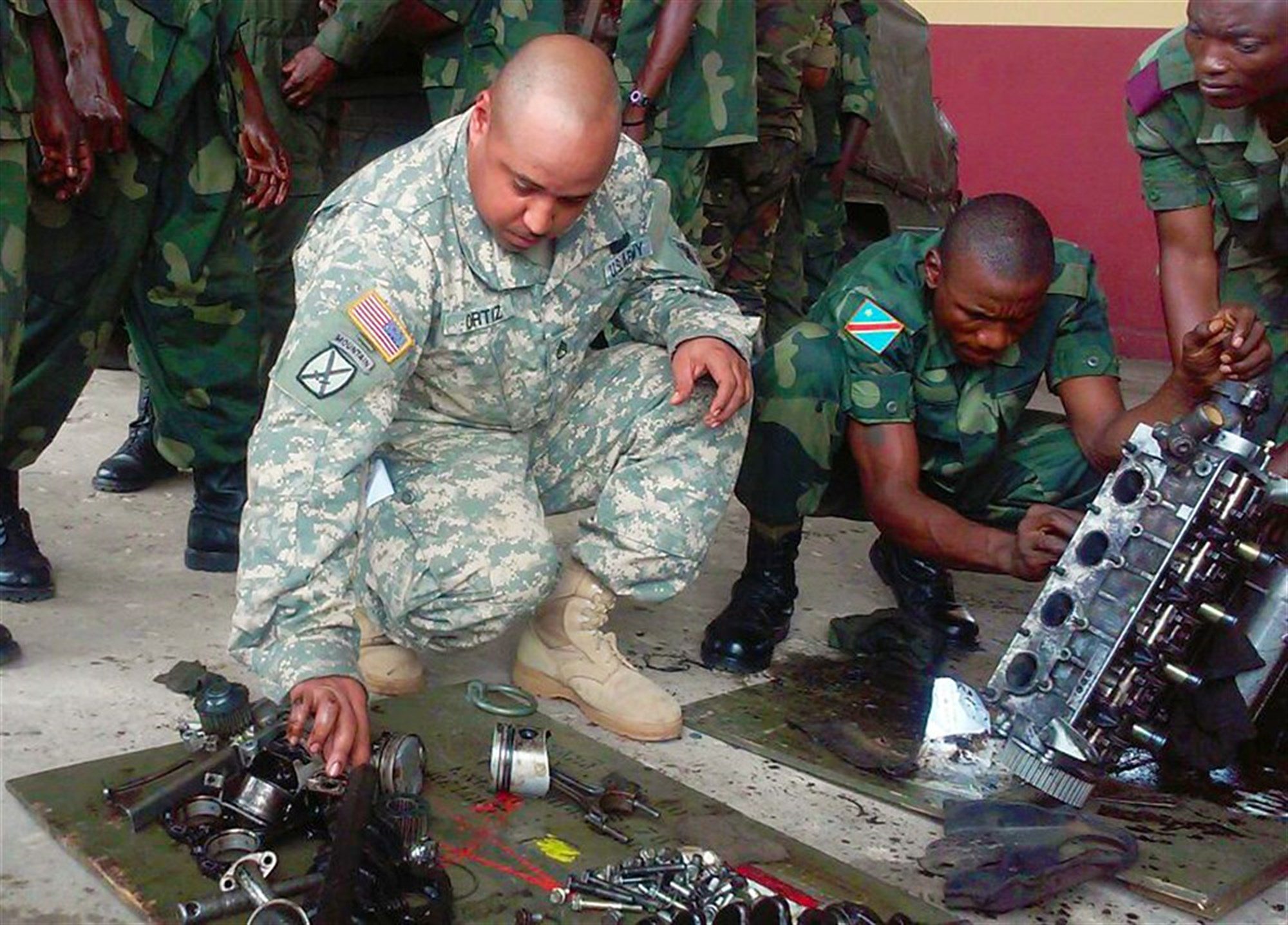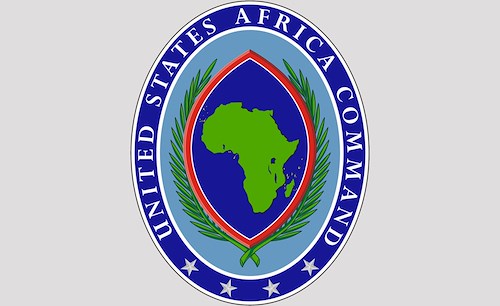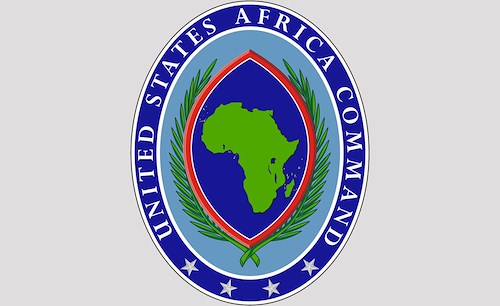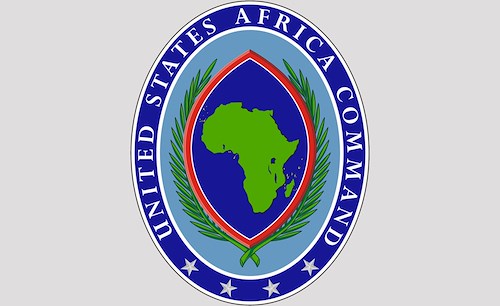Gallery contains 4 images
×
Photo 1 of 4
Opinion: Advancing Africa through Logisitics (1) of (4)
While the U.S. military played a supporting role through Operation United Assistance, our presence helped provide the confidence for the international community and the affected countries to respond and battle this deadly virus.
Photo 2 of 4
Opinion: Advancing Africa through Logisitics (2) of (4)
"We’re in a counterterrorism pinch and that’s no joke,” U.S. Defense Secretary Ash Carter said during a visit to U.S. Africa Command in June. “The evil of [Islamic State of Iraq and the Levant], narcotics, corruption, organized crime … are rife in Africa and ultimately they will come home to roost if we don’t combat it there, and that’s what you’re doing so ably.” DoD photo by Glenn Fawcett
Photo 3 of 4
Opinion: Advancing Africa through Logisitics (3) of (4)
When discussing economic potential at the Global Entrepreneurship Summit in July, President Barack Obama said, “This continent needs to be a future hub of global growth, not just African growth.” White House photo by Pete Souza
Photo 4 of 4
Opinion: Advancing Africa through Logisitics (4) of (4)
U.S. Army Africa's role in supporting training through the Democratic Republic of Congo's Defense Logistics School is an example of how AFRICOM can increase the capacity of partner nations to provide logistics support to their own forces. Here, Staff Sgt. Roberto Ortiz, a wheeled vehicle mechanic from AFRICOM’s Regionally Aligned Force, 3rd Brigade, 1st Armored Division from Fort Bliss, Texas, provides assistance to a DRC student rebuilding a light truck engine during hands on training at the DRC Logistics School. (U.S. Army Africa photo)
Africa is a fascinating continent with an abundance of opportunities and challenges. I believe the United States will continue its effort advancing Africa as it is in our national interest to have a peaceful, prosperous, and secure African continent. I also believe there is a strategic imperative for action as our nation is at a crossroads with challenges and opportunities that lie before us.
I must admit my experience with Africa was very limited prior to assuming my position as the director for logistics at U.S. Africa Command, and I am certainly no expert today. However, over the year I’ve served in AFRICOM, I have gained a great appreciation for this huge continent and all that Africa has to offer in terms of amazing opportunities and the wonderful people who live there, juxtaposed with some significant challenges that could impede progress as we journey down the path to a bright African future.
Africa is known for its vast resources. A continent three and a half times the size of the United States, whose width is nearly the size of its length, boasts some of the world’s largest resource reserves such as petroleum and organic metals. According to Business Insider, Africa holds 7 of the world’s 13 fastest growing economies to include countries such as Rwanda and Ethiopia.
Africans are embracing technology as they skipped land line telephones and went straight to cell phone technology. A Huffington Post article titled “In Parts of Africa, Cell Phones are Everywhere and Landlines Barely Exist” states, “New surveys from the Pew Research Center show the majority of adults in Uganda, Tanzania, Kenya, Ghana, Senegal, Nigeria and South Africa owned cell phones in 2014.”
Additionally, Africa is rich in the most precious resources – people! By 2050, Africa is projected to house 25% of the world’s population, the majority of which will be youth. In fact, today over 40% of the African population is under the age of 15. Therefore, it is vital to ensure effective governments exist to provide essential services for their people, while creating opportunities for this population so they don’t become disenfranchised and turn to negative behaviors such as crime or violent extremist activities.
In his visit to Africa in July, our commander in chief remarked, “Africa is on the move!” On a five-day visit to the continent, he spent time in his family’s homeland of Kenya and then visited Ethiopia. When discussing economic potential at the Global Entrepreneurship Summit, he commented, “This continent needs to be a future hub of global growth, not just African growth.”
Clearly other powers in the world see the importance of Africa. China is heavily investing in Africa--in countries such as Niger, Angola, and Zimbabwe. According to the New York Times, a Chinese Oil company has invested nearly $5B into Niger which is nearly equal to its annual GDP. On a recent visit to Djibouti, I was informed that a railway connecting the Port of Djibouti to Addis Ababa, Ethiopia - being built by the Chinese - is in the finishing stages.
Although there are many opportunities, there are also many challenges we face today. Violent Extremists Organizations, or VEOs, are recruiting in large numbers in Africa and exporting these fighters around the globe. The nexus between rampant corruption, poor governance and a disenfranchised population is a powder keg for negative influencers.
To put this in context, since AFRICOM stood up in 2008, there have been 14 irregular changes of government and all you have to do is look at today’s headlines to see other countries with significant power struggles on the brink of disaster. Following the tragedy of Benghazi, the Department of State classified 30 U.S. embassies as high threat/high risk posts; 15 of those are in Africa. The Department of State and Department of Defense have partnered to put mechanisms and response forces in place to prevent another such tragedy, but clearly Africa can be a dangerous place.
According to the Council on Foreign Relations, the Boko Haram insurgency in Nigeria killed over 10,000 people last year—these numbers are staggering and the trajectory could continue at least in the near term. This is a significant issue for our nation as we have many American citizens that live in Africa and visit there for vacation. Just think how many people enjoy an African safari or some of the sun drenched beaches. The horrible tragedy that occurred in Tunisia where over 30 foreigners were gunned down while enjoying a break on the beach is a clear reminder of the dangers that exist.
To illustrate some of the challenges that plague Africa, as I was writing this article, here are some of the headlines in today’s news: “10 Libyan Soldiers Killed Fighting Islamists in Benghazi,” “Suicide Attacks Killed at Least 13 in Northern Cameroon,” “Gunmen Kill 7 in attack on Tanzanian Police Station,” and “32 Killed in Al-Shabaab Attack in Somalia." The sad fact is this could be any day in Africa.
As Secretary of Defense Carter stated during his visit to AFRICOM in June: "Why does DoD need AFRICOM?" Carter asked.
“We’re in a counterterrorism pinch and that’s no joke,” the secretary emphasized. “The evil of [Islamic State of Iraq and the Levant], narcotics, corruption, organized crime … are rife in Africa and ultimately they will come home to roost if we don’t combat it there, and that’s what you’re doing so ably.”
In fact, the United States Agency for International Development reports in 2014 that 14 of 18 countries qualifying as highest risk of instability are in Africa. As cited in a report by Transparency International, “The Corruption Perceptions Index measures the perceived levels of public sector corruption worldwide.” Somalia tops the list along with North Korea.
To help tackle these challenges, international organizations are also heavily invested in Africa as we work together to bring peace and stability to the continent. In fact, of the 16 current United Nations peacekeeping operations around the globe, nine of them are in Africa comprising over 80% of UN peacekeepers. According to the latest UN Peacekeeping Fact Sheet dated August 2015, of the 124,746 people, serving on mission, over 104,000 are in Africa. In fact, one UN peacekeeping mission, The United Nations Organization Stabilization Mission in the Democratic Republic of the Congo, boasts 23,438, which is larger than the seven UN missions outside Africa combined.
If violent acts weren’t enough, there are additional challenges on the continent such as the loss of an important resource – wildlife. Central Africa has lost 64% of its elephants in only a decade as malicious actors are drawn to poaching due to the global market value for ivory, according to National Geographic last year. There are also huge health challenges in Africa as we were reminded during the Ebola outbreak. According to the Centers for Disease Control and Prevention, as of November, there were over 28,000 cases of Ebola resulting in 11,314 deaths.
As we work with our African partners, there is a great opportunity to make a positive impact in saving lives. This was clearly demonstrated during the Ebola crisis where international partners came together to support African nations during their time in need. The U.S. effort was focused on Liberia, while our French and British allies focused on supporting Guinea and Sierra Leone respectively. USAID served as our Nation’s lead federal agency in helping garner world support to make a positive difference and stop this deadly disease from spiralling out of control.
While the U.S. military played a supporting role through Operation United Assistance, our presence helped provide the confidence for the international community and the affected countries to respond and battle this deadly virus. Although the Ebola outbreak gained the world’s attention and a robust response, there are other health hazards on the continent that dwarf the Ebola crisis. As one example, according to the World Health Organization, there were 528,000 deaths from malaria in 2013, and about 78% of these were in children under 5. This is a tragedy that often goes unnoticed.
We tend to paint Africa with one brush, but Africa is composed of 54 very unique and distinct countries. Each Country has its own history and potential for a bright future. I was reminded on July 4th when we celebrated our Independence Day that most African countries are relatively young in their journey as an independent country, most only about 40 years old. To put that in terms we can relate to, picture the United States in the early 1800s as a young democracy trying to find its way in the world. It will take time for Africa to continue its prosperous path forward and we can certainly partner with them to lend support for their journey.
Like Africa, AFRICOM is also in its youth as a combatant command. Becoming fully operational capable in 2008, the command has come a long way in only seven years, but there is still much maturing to go. Our newly approved theater campaign plan outlines how we plan to use scarce resources as an economy of force command to make a real difference in Africa from the strategic level.
As outlined in the 2015 Posture Statement to Congress, “In Fiscal Year 2014, we conducted 68 operations, 11 major joint exercises, and 595 security cooperation activities. In comparison, we conducted 55 operations, 10 major joint exercises, and 481 security cooperation activities in fiscal year 2013.” We do this with minimal resources and rely significantly on our sister combatant command and partner in Stuttgart, Germany, U.S. European Command.
Like other combatant commands, we have service components that do most of the heavy lifting for AFRICOM. One component, U.S. Army in Africa, or USARAF, is in the final stages of completing their operational construct called, “African Horizons.” As stated in their Concept of Operations, “USARAF synchronizes Army actions to develop and deepen partnerships over time and across echelon to achieve strategic objectives.” The construct in nested in the AFRICOM Theater Campaign Plan and will help focus activities and drive results.
Our other component commands have similar constructs to ensure our efforts are aligned and synchronized for maximum effectiveness with limited resources. Here is an excerpt from an e-mail from an excited young major in USARAF that clearly articulates the impact they are having:
“Recently the Democratic Republic of Congo graduated its fourth class in 20 years (DRC Logistics School). What makes this graduating class unique is the intense involvement of the DOS, DOD, and other agencies in the building of the school as well as the development of the curriculum and their program of instruction. USARAF imbedded six Soldiers from its regionally aligned force [in order to] coach, teach, and mentor the cadre of the DRC Log School while assisting them with the continued refinement of curriculum, [program of instruction], and other planning products. Additionally, this is the DRC's first Logistics Defense Institution Build.”
Stories like this make me proud to be on the logistics team as the area I am most familiar with is logistics on the continent of Africa. Logistics is all about getting the right stuff, to the right place, at the right time. The tyranny of distance, combined with relatively poor infrastructure, and harsh weather patterns combine to make Africa one of the most challenging environments to operate in from a logistics perspective. These challenges present some great opportunities however, because small investments can go a long way towards making a real difference.
In June, the African Union hosted an annual Africa Logistics Forum co-sponsored by the African Center for Strategic Studies and AFRICOM. We had 38 African countries represented that canvassed the continent ranging from Morocco and Algeria in the north to Cameroon in the center and rounding out the south with South Africa. As our Rwandan partner put it, “This is the first-ever forum where logistics was the focus and we heard that logistics is for professionals and tactics for amateurs—it was a really good Forum that has brought together all the professionals with great experience!”
In just three days, we covered the landscape discussing many of the challenges we face as a community and developed a way ahead for working real solutions to real problems by identifying three priority areas: strategic lift, continental logistics base, and contingent owned equipment. Small investments at the institutional level working through our partners can have a lasting impact.
As previously mentioned, Operation United Assistance provided an opportunity to demonstrate in a practical way how much impact the United States can have as we partner with African countries to assist in their time of need. What was most impressive, were the unsung heroes – the Armed Forces of Liberia. We’ve been partnering with them for years to help build and professionalize their force. And when they were needed, they delivered. Not only did they remain calm and professional, they also jumped into action and even helped build the needed Ebola-Treatment Units to care for the ill. This is what success looks like.
Furthermore, Operation United Assistance was a perfect example of how the interagency can work together to solve real problems. As the lead agency, USAID worked seamlessly with the military to tackle this challenge and stem the growth of an epidemic. When I met with Jeremy Konyndyk, director of the Office of U.S. Foreign Disaster Assistance, we both agreed that this was a textbook example of teamwork among U.S. government agencies. As Deputy Secretary of Defense Bob Work commented during a recent visit April 17, the president may not know your names, but he knows what you did referring to the successful outcome fighting the Ebola virus in Liberia. He added, “You all are definitely punching above your weight class.”
As we look to the future in Africa, AFRICOM will continue to be there with our African, international and U.S. government partners to do our part in providing hope and helping build a prosperous future, while working toward a peaceful and secure environment today. Africa is a beautiful place. Our goal is do what we can to support an Africa that all can enjoy. We will continue to do this with limited resources to ensure the American people get the best value for their hard earned wages.

